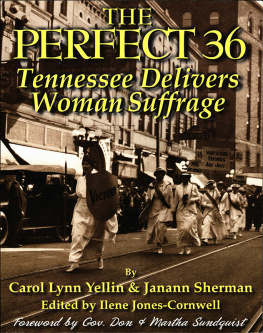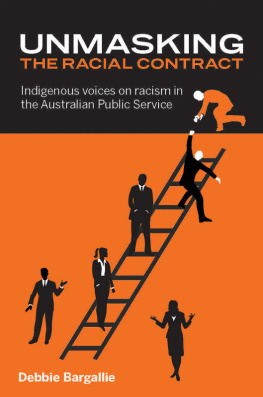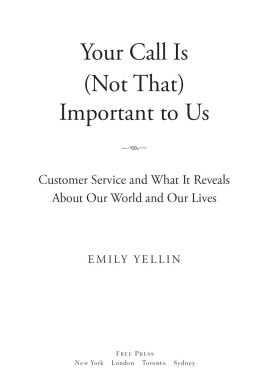2013 THE UNIVERSITY OF NORTH CAROLINA PRESS
All rights reserved
Manufactured in the United States of America
Designed by Jacquline Johnson
Set in Arno Pro
by Tseng Information Systems, Inc.
The paper in this book meets the guidelines for permanence and durability of the Committee on Production Guidelines for Book Longevity of the Council on Library Resources.
The University of North Carolina Press has been a member of the Green Press Initiative since 2003.
Library of Congress Cataloging-in-Publication Data
Yellin, Eric Steven, 1978
Racism in the nations service : government workers and the color
line in Woodrow Wilsons America / Eric S. Yellin.
p. cm.
Includes bibliographical references and index.
ISBN 978-1-4696-0720-7 (cloth : alk. paper)
ISBN 978-1-4696-2838-7 (pbk. : alk. paper)
ISBN 978-1-4696-0721-4 (ebook)
1. African Americans in the civil serviceHistory20th century. 2. African Americans Segregation. 3. Wilson, Woodrow, 18561924. I. Title.
JK723.A34Y45 2013
331.6396073009041dc23 2012037473
Portions of this book have been reprinted with permission in revised form from It Was Still No South to Us: African American Civil Servants at the Fin de Sicle, Washington History 21 (2009): 2247.
Illustrations
Swan Kendrick, circa 1909, and Ruby Moyse, circa 1915
Law Library, Howard University
Collage of photographs of African American civil servants assembled by W. E. B. Du Bois for the Paris Exposition of 1900
Employee record of Philip Shippen
Judson Lyons, circa 1908
Illustration of Grover Cleveland and Republican spoilsmen, 1884
Office of the Washington Bee, circa 1899
Theodore Roosevelt and Booker T. Washington at the Tuskegee Institute, circa 1902
Laura E. Joiner, circa 1920s
William Monroe Trotter
Woodrow Wilson, August 1912
National Democratic Fair Play Association meeting notice, June 1914
Woodrow Wilson and his cabinet, April 1913
Womens Work in the Treasury, circa 1900
Metropolitan AME Church, circa 1899
Archibald Grimk, circa 1919
The New FreedomFor the Negro, November 1914
Tuskegee principal Robert Russa Moton, May 30, 1922
Federal employees at a Public Health Service dispensary for government workers, circa 1920
Tidal Basin bathing beach, 1922
Acknowledgments
Luck comes to mind when I think about the incredible help I have had in writing this book. Telling the stories of people whose fortunes changed has reminded me continuously that we are all subjects of circumstances over which we have little control. And so it is wonderful to have the chance to express gratitude in print to the people and institutions that have made this book better and the writing easier.
This project began at Princeton University under the sharp and empowering mentorship of Nell Irvin Painter. Her kindness and generosity made the day-to-day writing possible, but her scholarship on the meaning of being human in a nation obsessed with race inspired the projects larger inquiry. Her work, bound or on canvas, continues to move me. Crucial, too, has been the support and incisiveness of Daniel T. Rodgers. Dans willingness to read multiple drafts, ask hard questions, and entertain failure has made me a more thoughtful historian and a more dedicated teacher. His insistence that we connect ideas with experience and experience with ideas confounds and animates my work every day. Others at Princeton have been invaluable teachers and mentors, especially Hendrik Hartog, William Chester Jordan, Kevin Kruse, Valerie Smith, Christine Stansell, and Richard Turits.
Scholars elsewhere have also made this project better. Gretchen Boger read drafts at every stage, and any clarity in the writing is thanks to her. Gary Gerstle, Howard Gillette, Steven Hahn, Sarah Igo, and Tour Reed played key roles in sharpening ideas and improving prose. Special thanks go to Joshua Derman for his help with the work of Max Weber. For their valuable comments on conference papers, on drafts, and in conversations, I thank Cathleen Cahill, Christopher Capozzola, Dan T. Carter, Benjamin Fordham, David Greenberg, William P. Jones, David Krugler, Adriane Lentz-Smith, Kate Masur, Mary-Elizabeth Murphy, Roy Rosenzweig, Samuel Schaffer, Zachary Schrag, Martin Shefter, Jeffrey Stewart, and Chad Williams.
At my new home at the University of Richmond, I have had the privilege of joining a rich community of scholars and teachers. I did not expect to receive the same level of caring mentorship on the job as I did in school, but Hugh West is an extraordinarily gifted department chair with the brain for administration and the heart for developing young academics. Like Hugh, Bob Kenzer read this manuscript at its most bloated stage and gave me the confidence to make it shorter. The fact that so many other colleagues have blurred into friends is another reason to be grateful. Special thanks go to Bert Ashe, Joanna Drell, Debbie Govoruhk, Ray Hilliard, Woody Holton, Amy Howard, Glyn Hughes, Tze Loo, Manuella Meyer, Nicole Maurantonio, Rob Nelson, Kevin Pelletier, David Routt, Monika Siebert, John Treadway, Sydney Watts, and Ycel Yanikda for support, inspiration, and good humor. My thanks, also, go to the many wonderful students I have had at Richmond; in particular, Chris Florio, Kara Schultz, and Luke Victor have given me great faith in the future of historical studies.
As I try to show in this book, money matters. I am grateful for the financial support of the history departments at Princeton and Richmond. Thanks go to the Princeton University Graduate School for its university fellowship, the Rollins and Davis Prizes, and the Charlotte Elizabeth Procter Fellowship. The University of North Carolina at Chapel Hill provided a John Eugene and Barbara Hilton Cay Research Stipend. Stanley Katz and the Fellowship of the Woodrow Wilson Scholars gave two years of financial and intellectual support. The School of Arts and Sciences at Richmond provided summer and sabbatical funding. A postdoctoral fellowship at the John W. Kluge Center allowed for a long swim in the deep research pools of the Library of Congress. I treasure my chats with Mary Lou Reker, who, along with Director Carolyn T. Brown and the other Kluge staff, helped to make my time at the library very productive.
Sometimes shelter magically comes without money, but never without the kindness of friends. Rob and Polly Wright provided a home in which to live and unwind after long days of researching at the National Archives in College Park. Karen and Alan Senter provided a wonderful berth in New York, and Arthur Sackley gave a home and companionship in Washington. Other close friends offered shelter in the metaphorical sense: my tremendous thanks go to Dan Burstein, Sander Cohan, Josh Derman, Dave Ekbladh, Abby and Michael Goldman, Abby Heald, Tom King, Gene Perelson, Juliet Ross, Don Saelinger, and Sherwood Waldron Jr. for just about everything.
As any historian knows, research is only as good as the archivists you meet along the way. My greatest debt is to Lisa Boykin at the National Personnel Records Center in St. Louis, Missouri. Lisa answered an email many years ago and made this whole book possible. My three trips to St. Louis were terrific, thanks to Lisas personal warmth and hard work. I also thank all of the NPRC staff members who helped Lisa comb the records center for the personnel files of early-twentieth-century civil servants. At the National Archives and Records Administration, I was fortunate enough to work with Rodney Ross in Washington and Walter B. Hill in College Park, Maryland. At the Library of Congress, Adrienne Cannon connected me to Joseph Kendrick Brooks and his familys incredible story. Jim Gwin has been a bedrock of research support at the University of Richmonds Boat-wright Memorial Library. Also at Boatwright, Chris Kemp and his team did heroic work on the books illustrations. At the Washingtoniana Division of the District of Columbia Public Library, Margaret Goodbody offered wonderful resources and advice. Daniel Linke at the Manuscripts Division of the Princeton University Library gave me access to Arthur Links intricate filing system for the Woodrow Wilson Papers Project. Grace Palladino at the Samuel Gompers Papers Project helpfully answered a query about black unionists. Finally, this project would not have been possible without the special collections staffs at Howard Universitys Moorland-Spingarn Research Center, Harvard Universitys Houghton Library, the University of Virginia, and the Virginia Historical Society.










